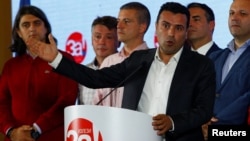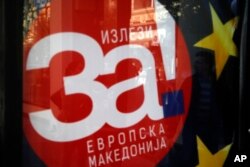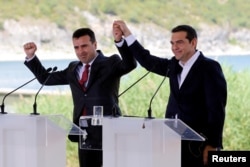Macedonia's prime minister says he will seek a vote in parliament to change his country's name in a bid to end a 27-year dispute with neighboring Greece and enable Macedonia to join NATO.
Despite most voters' shunning of Sunday's referendum on the renaming of the Balkan country, Prime Minister Zoran Zaev said he has the mandate he needs to proceed. His aides and Western diplomats also have accused Russia of mounting a coordinated disinformation campaign in the run-up to the vote to suppress turnout.
Only a third of the country's 1.8 million electorate cast votes on changing Macedonia's name to the Republic of North Macedonia, far short of the 50 percent threshold that would have made the plebiscite binding in parliament.
Those who did vote overwhelmingly backed the name change, with 91.3 percent favoring the rebranding, compared to 5.7 percent opposed, according to the electoral commission.
"The people made a great choice and said 'yes' to our future. It is time for lawmakers to follow the voice of the people and to provide support," Zaev said at a press conference Sunday. "The will of those who voted now must be turned into political action inside parliament."
His aides acknowledge they are in for a tough political fight in the 120-seat parliament and fear disruption from nationalists, some allegedly funded by the Kremlin, as they forge ahead.
The United States and the European Union urged Macedonian lawmakers to back the change, saying voters had "expressed their support for NATO and EU membership."
"As Macedonia's parliament now begins deliberation on constitutional changes, we urge leaders to rise above partisan politics and seize this historic opportunity to secure a brighter future for the country as a full participant in Western institutions," State Department spokeswoman Heather Nauert said.
Greece has blocked Macedonia's joining NATO because of the long-running quarrel over the name, which goes back to when Macedonia declared independence as Yugoslavia broke apart more than two decades ago.
For both Greeks and Macedonians, the name is tied to national identity. Ancient Greece's Macedonia stretched across both present-day countries and was the birthplace of Greek heroes, including Alexander the Great.
In June, the Greek and Macedonian prime ministers, urged on by Washington and Brussels, reached a landmark compromise, known as the Prespa Agreement, under which Greece would drop its objections to Macedonia's joining the EU and NATO in return for the name change.
In both Greece and Macedonia, nationalists have mounted fierce opposition to the deal, among them Macedonian President Gjorge Ivanov, who dubbed it a "flagrant violation of sovereignty."
Nationalists on Sunday night celebrated the low turnout, declaring it a victory for the opposition camp. "It is clear that the agreement with Greece has not received the green light from the people," nationalist Hristijan Mickoski told journalists.
Western diplomats say Macedonia, like the Balkans as a whole, has become part of a tug-of-war between Russia and NATO. Internet monitors from research institutions say dozens of suspicious campaign websites appeared before the referendum, urging voters to stay away from polling stations and to boycott the name change, arguing that Macedonian ethnic and national identities were under threat. Russian-owned media outlets echoed the warning.
Days before the voting, internet monitors at the Atlantic Council, a New York-based research group, said "Macedonia's information environment is becoming clouded with distorted and polarizing narratives by some Russian media outlets, especially from Sputnik — a state-funded online outlet."
Recently, the U.S. ambassador to Greece, Geoffrey Pyatt, accused Russia of trying to block Western Balkan states from joining NATO, citing a coup attempt last year in Montenegro as part of that effort.
In an interview with VOA, he said "we are very sensitive to the role that Russia continues to play across this region. Illustrated by the coup attempt in Montenegro. Illustrated in Russia's attempt to derail the Prespa Agreement between Athens and Skopje. Illustrated by the use of energy as a political weapon."
The Kremlin dismisses claims of underhand interference in the Balkans. Sergey Lavrov, the Russian foreign minister, has accused the U.S. and the European Union of trying to force western Balkan countries to choose between Russia or the West.
Disputes in the region "must be settled on the basis of mutual consent of all the interested parties, with full respect of the opinion of the population of the relevant countries," he said during a visit last month to Bosnia-Herzegovina.
Even so, Russia openly opposed Sunday's vote, with its ambassador in Skopje warning Macedonians they could become a "legitimate target," if relations between Moscow and NATO deteriorate further.
For all of his determination, Prime Minister Zaev will face a challenge in getting the name change, say analysts. The nationalist opposition holds 49 seats in the 120-seat parliament, enough to block the two-thirds majority required to change the constitution. If Zaev fails, his only alternative would be to call early elections.


